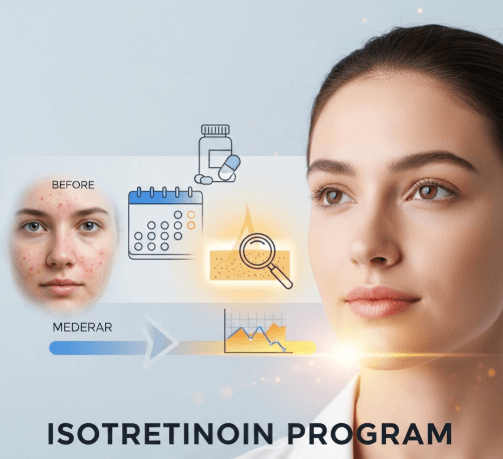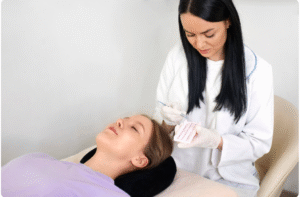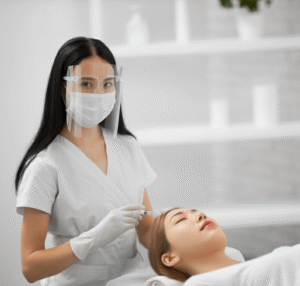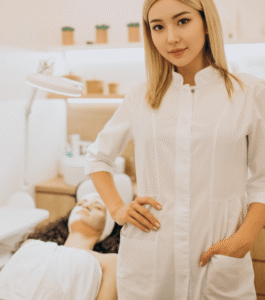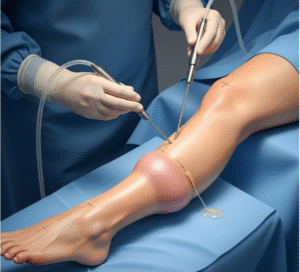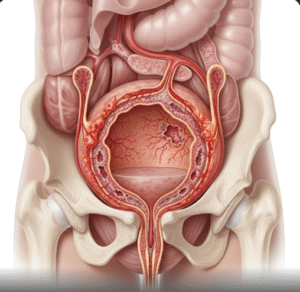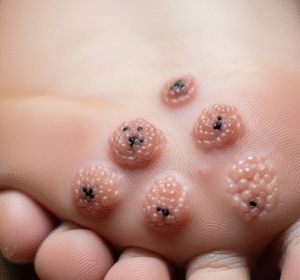What it is in Korea
➤ Isotretinoin program in Korea refers to a systematic acne treatment plan using isotretinoin (commonly known by its former brand name Accutane) under close dermatological supervision.
→ Isotretinoin is a vitamin A derivative (retinoid) that works by:
- Shrinking sebaceous (oil) glands
- Reducing sebum production
- Preventing clogged pores
- Eliminating acne-causing bacteria
- Regulating skin turnover
✦ In Korea, isotretinoin is considered a last-resort but highly effective therapy, especially for severe, cystic, scarring, or treatment-resistant acne.
✔ Korean isotretinoin programs are structured with personalized dosing, monthly monitoring, and integration with skincare support, ensuring maximum results with minimized risks.
Why it’s done in Korea
▸ Medical reasons → Isotretinoin is prescribed when other therapies (topical retinoids, antibiotics, hormonal therapy) fail.
▸ Aesthetic reasons → Prevents permanent acne scars and improves skin quality in resistant cases.
▸ Preventive reasons → Offers long-term remission, reducing relapse compared to other treatments.
✔ Korean dermatologists recommend isotretinoin programs when:
- Acne is severe, nodular, or cystic
- Previous treatments have failed
- Acne causes psychological stress (low confidence, social anxiety)
- There is high risk of scarring
Alternatives in Korea
While isotretinoin is powerful, alternatives may be considered first or alongside it:
➤ Topical therapies
- Benzoyl peroxide → antibacterial and anti-inflammatory
- Topical retinoids (tretinoin, adapalene) → regulate skin turnover
- Azelaic acid → gentler option for pigmentation and rosacea
➤ Other oral medications
✔ Antibiotics (doxycycline, minocycline) → moderate acne relief
✔ Hormonal therapy (oral contraceptives, spironolactone) → for hormonally driven acne in women
➤ Procedural options
✦ Chemical peels → resurface acne-prone skin
✦ Laser therapy → reduce oil production and scars
✦ Cystic acne injection → fast relief for painful nodules
Preparation in Korea
Before starting isotretinoin, Korean dermatologists take strict safety measures:
▸ Medical evaluation
→ Comprehensive consultation and medical history review.
→ Baseline blood tests (liver function, lipid profile) to ensure safety.
▸ Patient education
✦ Explanation of potential side effects and importance of follow-up visits.
✦ Strict advice against pregnancy during and for 1 month after treatment due to severe birth defects risk.
▸ Lifestyle guidance
✔ Avoid alcohol, as it increases liver strain.
✔ Use hydrating skincare and lip balms to counter dryness.
✔ Apply broad-spectrum sunscreen daily, since skin becomes sun-sensitive.
How it’s done in Korea
An isotretinoin program in Korea follows a step-by-step, carefully monitored protocol:
- Customized dosing
➤ Dose is based on patient’s weight (usually 0.5–1 mg/kg/day).
→ Korean dermatologists often start with a low dose and gradually increase to minimize side effects. - Treatment duration
✦ Most programs last 16–24 weeks (4–6 months).
✦ Goal: reach a cumulative dose that minimizes relapse risk. - Monthly follow-up
✔ Regular dermatologist visits to track progress and adjust dose.
✔ Monthly blood tests for liver and cholesterol monitoring. - Supportive care
→ Moisturizers, soothing essences, and K-beauty barrier creams are recommended to ease dryness.
→ Some clinics include LED light therapy or scar prevention treatments during the program.
Recovery in Korea
▸ Initial phase (2–4 weeks)
✔ Acne may temporarily worsen (“purge phase”).
✔ Dryness of lips, skin, and eyes usually begins.
▸ Mid-treatment (2–3 months)
→ Visible improvement in acne severity.
→ Cysts shrink, redness reduces, and fewer new pimples appear.
▸ End of treatment (4–6 months)
✦ Skin shows significant clearing.
✦ Many patients achieve long-term remission, with little or no recurrence.
Complications in Korea
Isotretinoin is powerful and requires medical oversight. Possible side effects include:
➤ Common issues
- Dry lips, skin, and eyes
- Nosebleeds from dryness
- Sun sensitivity
➤ Systemic risks
✦ Liver strain (requires monthly monitoring)
✦ Increased cholesterol or triglycerides
✦ Muscle/joint pain in rare cases
➤ Serious risks
✔ Pregnancy risk → must be strictly avoided
✔ Rare psychiatric effects (mood changes, depression)
✔ Korean dermatologists minimize risks with strict monitoring, safe dosing, and supportive skincare regimens.
Treatment Options in Korea
Korea is internationally recognized for its advanced acne management programs, including isotretinoin.
➤ Major hospitals
- Seoul National University Hospital Dermatology → Provides structured isotretinoin programs with close monitoring.
- Yonsei Severance Hospital → Offers isotretinoin for severe acne, combined with scar treatments.
➤ Private dermatology clinics (Gangnam, Apgujeong, Myeongdong)
✔ Oracle Skin Clinic, Banobagi Dermatology, ID Dermatology → Offer customized isotretinoin programs with integrated scar prevention and K-beauty skincare.
➤ K-beauty integration
✦ Korean dermatology often combines isotretinoin with hydrating essences, barrier-repair creams, and sun care routines.
✦ Medical tourism patients benefit from English-speaking staff, monthly monitoring packages, and aftercare kits.
Conclusion in Korea
➤ Isotretinoin program in Korea is one of the most powerful and reliable treatments for severe or resistant acne, offering long-term remission and scar prevention.
→ The program is structured with personalized dosing, regular monitoring, and supportive skincare, making it both safe and effective.
✦ With Korea’s expertise in dermatology, scar prevention, and integration with K-beauty care, isotretinoin programs are a globally trusted solution for achieving lasting clear skin and renewed confidence.

